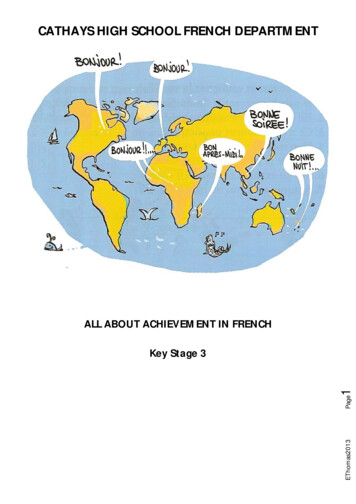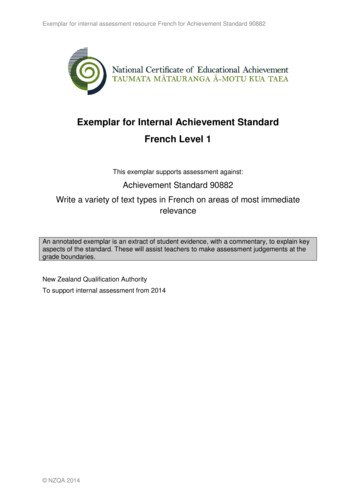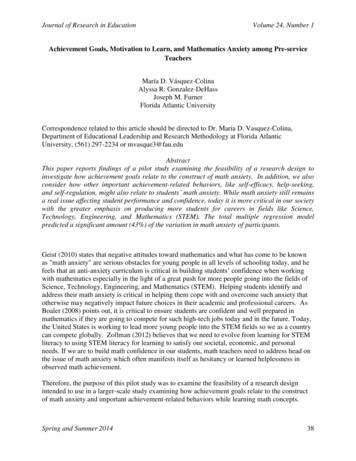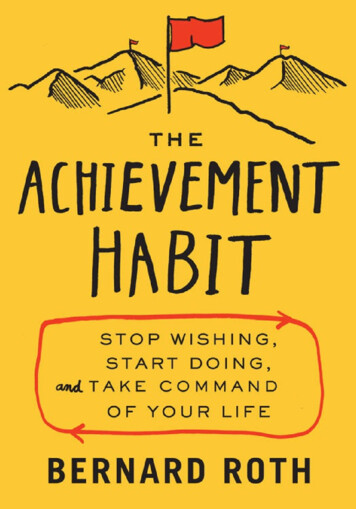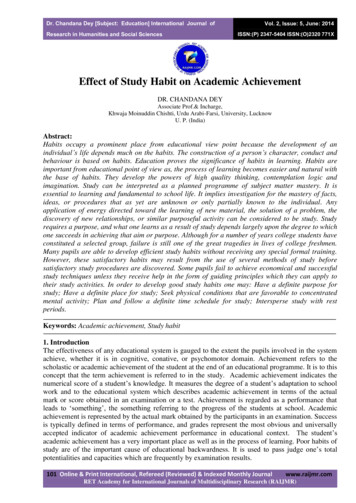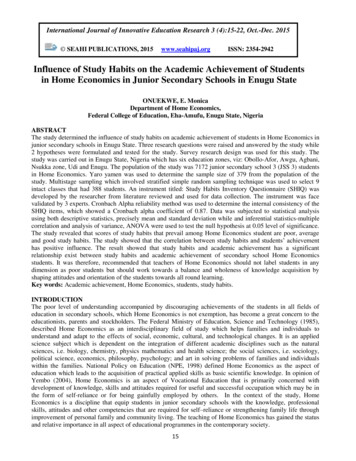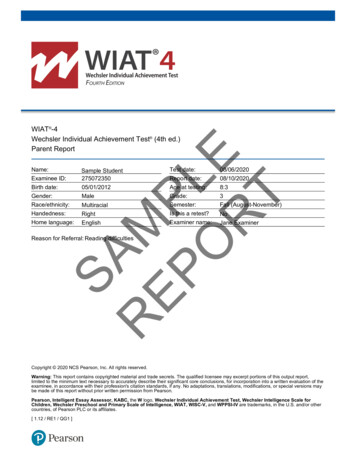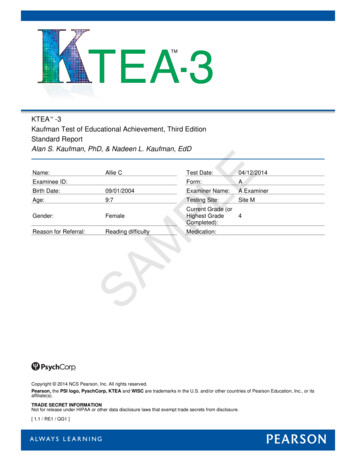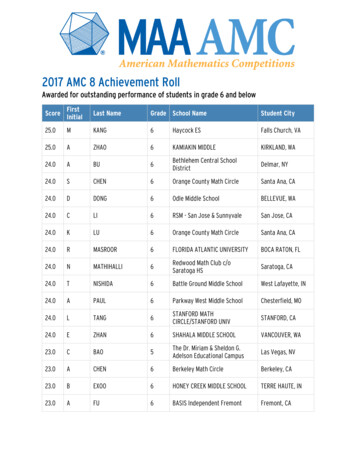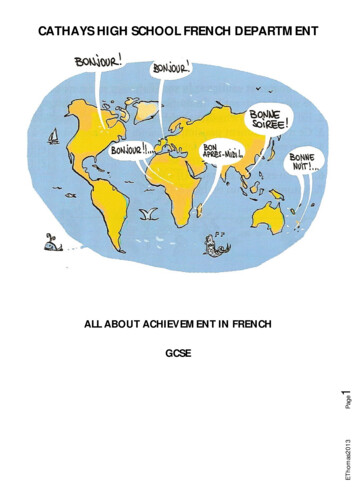
Transcription
CATHAYS HIGH SCHOOL FRENCH DEPARTMENTALL ABOUT ACHIEVEMENT IN FRENCHEThomas2013Page1GCSE
Feedback will be given in the following ways:You will have a short comment in French e.g. Très bien / Pasmal / Complète!You will have a star followed by a positive comment. This is tocelebrate your good work, progress, presentation orachievement and to say well done!You will then have a dot followed by advice on how your workcould be improved further. You will be given direct guidance asto how to improve.You will get lots of stamps like these from yourFrench teacher. You will get them for goodwritten work and good participation in class.Every time you get 3 stamps like this, you areentitled to claim 1 commendation from yourFrench teacher.We also use this stamp a lot. You will see a ticknext to the statements that apply to that piece ofwork. Vu et lu seen and read. Attention à la présentation Take more carewith your presentation. Attention à l’orthographe Be careful withyour spelling. Continue! Keep up the good work. Remember, it is not just the teacher who marks your work! You will be involved inassessing your work and progress, as will fellow pupils in the class.PageEThomas2013Of course, at times your teacher will also speak toyou about your work and progress. This will bereflected in “Oral feedback given” stamps in yourbook.2This is the stamp we don’t like to use. YourFrench teacher will put this stamp on your book ifyour homework isn’t done, or if it isn’t complete.You will receive a detention for every homeworkthat you fail to hand in or complete.
Careful workWell presentedGood effortKeep this upMuch betterPageExcellentGreat!Super!Very good workVery good effortVery goodGood work – keep this upThis is goodWell doneGood effortQuite goodGoodSatisfactorySatisfactory but too many mistakesNot badNot too badAverageLack of concentrationMore detail neededTake more care with spellingTake more care with presentationNot satisfactory – too many errorsCarelessNot enough effortConcentrateTake more care with spellingTake more care with presentationUnacceptableVery unsatisfactoryFinish this workNo work doneLack of applicationNo effort madeNo comment!UnacceptableAtrocious!See me!EThomas2013Excellent!Extra!Super!Très bon travailTrès bon effortTrès bienBon travail – continueC’est bienBien faitBon effortAssez bienBienSatisfaisantSatisfaisant mais trop d’erreursPas malPas assez bienMoyenManque de concentrationPlus de detail!Attention à l’orthographeAttention à la présentationInsuffisant – trop d’erreursNégligentPeu d’effortsConcentre-toi!Attention à l’orthographeAttention à la présentationInacceptableTrès insuffisantComplète!Pas de travailPas sérieuxPas d’effortsSans commentariesInacceptableNul!Viens me voir!ENCOURAGEMENTSTravail soignéBonne présentationDes effortsContinueBeaucoup mieux3COMMENTS FOR CLASSWORK AND HOMEWORK
LITERACY AND FEEDBACK CODES FOR ASSESSING WORK Sp in the margin and theThis means that a word has been speltincorrectly. You need to write the correctversion 3 times.word underlined . Large letter over a small oneYou need a capital letter here! Small letter over a large one.No capital letter needed here! P in the margin and the mistakeunderlined.You have made a punctuation mistake(capital letter, full stop, comma, questionmark etc). ? in the margin.Is this what you mean? You have missed out a word or letter.PageMEANINGEThomas2013CODE4 When your work in French has been marked, you will notice the following codes. Here isan explanation of the codes and what they mean:
Writing good targets in FrenchThe following are ideas that you can use to help you to write targets for yourlearning in your French lessons.GENERAL1. I will present my written work carefully so that is easy to read (suitable pen, letterson the line etc.)2. I will bring all of my equipment to the lesson (book, planner, pen, pencil, ruler).3. I will use a ruler to underline titles and dates.4. I will use my class notes to help me to check my independent work.5. I will make sure all my classroom talk is focussed on learning and the task that hasbeen given.6. I will speak clearly and confidently when presenting my work in class.7. I will make eye contact with those who are listening when I speak.8. I will listen to others and respond appropriately.9. I will ask questions of others and answer questions they ask when I am working in agroup.10. I will pick out any words I read that I don’t understand and find out what they meanusing the 4 Cs (cahier, cerveau, copain, chef).PageEThomas20131. I will use capital letters appropriately in French.2. I will learn to use the French language tools on the computer.3. I will check my accents as I am writing.4. I will learn to recognise and use question words in French.5. I will learn to recognise patterns of spelling and sounds in French.6. I will use a variety of connectives correctly to make my language more interesting.7. I will use a variety of verbs to extend my writing.8. I will use a variety of adjectives to extend my writing.9. I will use the dictionary to look up words I don’t know.10. I will learn to use the online dictionary appropriately.11. I will use a variety of tenses to extend my language.12. I will use French to ask for things that I need.5LANGUAGE-SPECIFIC
TEACHING AND LEARNING TERMS What are learning objectives?My view:Class view: What is target-setting?My view:Class view: What is a plenary?My view:Class view: What is self-assessment?My view:Class view: What is peer-assessment?PageClass view:6My view: What are key skills? Can you name them?Class view:EThomas2013My view:
All about GCSE FrenchDuring the 2 year course (summer term of year 9 to summer term of year 11), we will coverthe following topics, as laid down by the WJEC specification:Personal and social life Self Shopping Free Time Family Meals Fashion Friends Healthy Living Relationships Home life Illness & Accident Future plansLocal Community Home town School EducationThe World of work Work experience Part-time jobsThe Wider World Travel & Holidays Media Local environment Pollution recycling local facilities comparisons with otherregions weather & seasons Future careers Technology Social Issues FrancophoniePageEThomas2013Listening20% of total Listening exam in year 11. Tiered paper: foundation – G – C or higher D – A* Lasts 35 – 45 minutes. You listen to recordings in French and answer questions in English.Speaking30% of total Examined by controlled assessment. You will do at least 1 structured discussion. The mark for the best one you do will beentered. You will do at least 1 presentation & discussion. The mark for the best one will beentered.Reading20% of total Reading exam in year 11. Tiered paper: foundation – G – C or higher D – A* Lasts 35 – 45 minutes. You read texts in French and answer questions in English.Writing30% of total Examined by controlled assessment. You will do at least 2 pieces of writing under exam conditions during the 2 years.Most people complete 4 or 5. The best 2 pieces of work are then entered for grading.7Assessment at GCSE
Grades at GCSEWhere would you put yourself on the scale of achievement?AWhen Listening and responding, I can: understand French on a wide range of topics, factual and imaginative; work out the meaning of new words.When Speaking, I can: speak easily, confidently and spontaneously about many things; speak with good pronunciation and intonation speak clearly, with very few errors of grammar or vocabulary.When reading and responding, I can: understand what people have written about their feelings, opinions and pointsof view, as well as more factual information; work out the meaning of new and complex vocabulary through the context ofwhat I am reading.When writing, I can: use a range of tenses, vocabulary and structures to make what I say as variedand interesting as possible.When Listening and responding, I can: understand long passages of French spoken at normal speed.When Speaking, I can: hold a conversation about everyday life and things I’m interested in. speak with good pronunciation; change between the past, present and future quite easily.When writing, I can:Page read and understand a wide range of texts, from magazines and books as wellas from my text book and workbooks.8When reading and responding, I can: write accurately but I often need to re-draft my work.EThomas2013B
CWhen Listening and responding, I can: understand people giving their opinions and talking about the past, present andfuture in a variety of everyday circumstances.When Speaking, I can: hold a short conversation about everyday life; speak reasonably correctly, with a good accent.When reading and responding, I can: read quite quickly, and I can pick out details without having to read every word; understand when people have written about the past as well as the present andthe future.When writing, I can: use the past, present and future tenses; write reasonably accurately, but can be understood even when my writing isnot totally correct.When Listening and responding, I can: pick out the main points and some details from passages of French; understand as long as things are repeated more than once.When Speaking, I can: manage to answer about 8 – 10 questions about the topics we have beendiscussing in class; make myself understood, although I do make mistakes; speak with a reasonable accent.When reading and responding, I can: can pick out specific details from a French text.Page write a short paragraph about a familiar topic; make myself understood, although I do make mistakes.9When writing, I can:EThomas2013D
EWhen Listening and responding, I can: pick out the main points and some details from passages made up of familiarlanguage.When Speaking, I can: have a simple conversation with my teacher, using about 4 or 5 sentences. speak with a bit of a French accent.When reading and responding, I can: understand the main points and some detail of written passages.When writing, I can: write three or four sentences in French or adapt a model to write a short text.FWhen Listening and responding, I can: understand the main points of passages on familiar topics.When Speaking, I can: say simple sentences about familiar topics.When reading and responding, I can: understand short, simple texts.When writing, I can: write about myself and my family and my likes & dislikes in French.When Listening and responding, I can: understand short sentences, instructions and questions if people speak slowlyand clearly and use words I know well.When Speaking, I can: answer simple questions and give short descriptions of people and things.When reading and responding, I can: read and understand short phrases consisting of words we have learned in class.When writing, I can:Page10 copy short phrases correctly. When I write from memory, I spell most of thewords correctly.EThomas2013G
My assessment record11level achievedPageSkill assessedEThomas2013Date
ALL ABOUT REVISION: Here are some useful websites to help youwith your revision – the earlier you check these out, the better! BBC GCSE Bitesize – the original and possibly the best – good for reading and listening – and it’s nch/ Linguascope/Linguastars – http://www.linguascope.com Zut! – http://www.zut.org.uk – school account id is 2076. Pupil password is cathays french (all lowercase and with the space) The Australian Site – http://www.education.vic.gov.au/languagesonline/ Digital Dialects – http://www.digitaldialects.com Ver-taal – http://fr.ver-taal.com/vocabulaire.htm Languages Online –http://www.languagesonline.org.uk French in a Click – some paid activities, though some are free (link here is to free section). Also on fb ree sections.shtml Ashcombe school - this website had many videos and fill the gap exercises – the videos have stoppedworking, but you can still look at the script and therefore use them as reading culum/modlang/french/index fr video.htm http://exercices.free.fr/francais/orth/index.htm - Good exercises for practising accuracy in writing.www.s-cool.co.uk – Revision activities specifically tailored towards the exams. Better for Foundationthan Higher.http://www.digitaldialects.com/French.htm - fun (if slightly odd) games to help you remember chansons/ - French pop songs with exercisesNgfl Cymru – a site intended for teachers to download teaching materials, but there’s some superbresources that you can download and work through yourself - vtc-ks4-french(2) http://duolingo.com/ - Duolingo – a free online course that helps you to learn by translating the web. French revision – this is the link to the sample exercises – the full site is paid, but the samples should beenough – the questions are Edexcel, but they’re similar enough for it not to matter http://www.frenchexams.org/edexcel sample/ Modern Languages at Burntcliffe – links to some (very old) past papers, but the listening texts are theretoo - http://bruntcliffe.typepad.co.uk/bruntcliffe school modern/french video sound/Pagehttp://www.babbel.com12Babbel – this is a paid course that you can use online or as an app. There is also a free version EThomas2013
EThomas2013 Page. 2. Feedback will be given in the following ways: You will have a short comment in French e.g. Très bien / Pas mal / Complète! You will have a star followed by a positive comment. This is to celebrate your good work, progress, presentation or achievement and to say well done!
